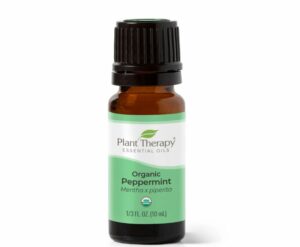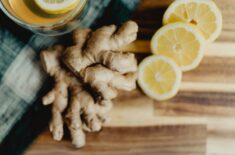Overview
Are you planning a home birth, or will you give birth at the hospital?
Whether it’s your first time having a baby or not, you might find essential oils and aromatherapy helpful for easing your labor pains. (1)(2)(3)
These oils can also provide you with a calming, relaxing atmosphere for your birthing experience. (4)
Read on to learn more about essential oils for labor and which ones you should pack in your hospital bag. You can also ask your doula to bring some oils along with your birth plan.
What Essential Oils Help During Labor?
Going into labor can be a scary experience, especially for first-time moms.
But don’t listen to horror birth stories from other moms because every birthing experience is unique.
These are the best essential oils for labor aromatherapy:
Lavender Essential Oil




- Safe for use during labor, lavender may help you feel relaxed. (1)(2)
- Studies show that lavender oils might help reduce labor pains. (1)(2)
- Use a carrier oil (like olive or coconut oil) for dilution.
- It can be blended with clary sage oil, or Damascus rose oil for better results.
Safety & Caution:
- May cause skin sensitization
- Safe for use during pregnancy
- Safe for use with children 3+ months old
Sweet Orange Oil




- It may help you feel less stressed during labor. (1)(7)
- It might also help reduce labor pains. (1)(6)
Safety & Caution:
- Safe for use during pregnancy
- Safe for use in children 3+ months old
Peppermint Oil




- This oil may help you feel more comfortable during labor. (1)(6)
- It might also help reduce anxiety and labor pains. (1)(6)
Safety & Caution:
- Unsafe during pregnancy and breastfeeding
- Use only with children 6+ years old
- Don’t use it if you have epilepsy
- Can be choleretic (can affect bile secretion from the liver)
- Can be neurotoxic (toxic to the central and peripheral nervous system)
- Can irritate mucous membranes
Eucalyptus Oil




- This relaxing oil may have a positive impact on your labor. (9)
- It might help reduce labor pains. (9)
- It can also make you feel less stressed or anxious. (9)
- It may also help manage your blood pressure. (9)
Safety & Caution:
- Don’t use with children below 6 years old
- May cause CNS (central nervous system) and breathing problems in younger children
- Unsafe for use during pregnancy
Ylang-Ylang Oil




- It’s a floral oil that may help reduce anxiety. (13)
- It’s more costly than wood or citrus oils, but it smells good and might be more effective.
Safety & Caution:
- May cause skin sensitization
- Safe to use during pregnancy
- Safe with children 2+ years old
- Excessive use may cause headaches and nausea
Bergamot




- This oil’s scent may have a calming effect. (10)
- It might help reduce anxiety during labor. (10)
Safety & Caution:
- It’s a phototoxic oil that can cause burns when skin is exposed to sunlight
- It can irritate sensitive skin
- It’s safe for use in pregnancy
- Safe for use with children 6+ months old
Sweet Almond Oil




- This oil may help induce labor by causing uterine contractions. (14)
- This oil might help prevent or minimize tears on your perineum (area between your vagina and anus). (15)
- It could help your perineal area become more supple and stretchable to minimize tearing during labor. (15)
- Starting from around 34 weeks gestation, gently massage this oil on your perineum. (15)
Safety & Caution:
- Don’t use this oil if you have nut allergies. (15)
- Safe for use during pregnancy
- Safe for use with children 2+ years old
Citrus Oils (Orange and Lemon)
Lemon




Orange


- These uplifting oils may help you feel energized yet calm during labor. (6)
- The oils may help reduce nausea. (6)
- They can provide a relaxing atmosphere while you’re in labor. (6)
- Staying relaxed during labor can help you conserve your energy for the most difficult, painful parts. (6)
Safety & Caution:
- It’s a phototoxic oil that can cause skin irritation
- Safe for use during pregnancy
- Safe for use with children 2+ years old
Wood Oils



- These are essential oils from wood: pine, sandalwood, cypress, copaiba, balsam fir, and cedar.
- These may help create a soothing room for labor, similar to the feeling of walking in a forest.
- These wood oils may help you stay calm.
Safety & Caution:
- Don’t use it if you have epilepsy
- It’s safe for use during pregnancy
- It’s safe for use with children 6+ months old
Clary Sage Essential Oil


- It’s a strong oil that may be used to promote strong, regular contractions based on anecdotal accounts. But no scientific studies showed that it can induce contractions.
- This oil might also help ease your labor pains. (1)
- It shouldn’t be rubbed directly on your skin. Instead, use an inhaler or put it on a cotton ball.
Safety & Caution:
- May cause skin sensitization
- Don’t use during pregnancy
- Don’t use while drinking and driving
- Safe for children 2+ years old
Can I use clary sage oil at 37 weeks?
- No. Pregnancy at 37 weeks isn’t considered as full term. Unless your doctor recommends giving birth before 38 weeks, don’t use this oil yet.
Jasmine Oil


- A 2014 clinical trial showed that a massage with jasmine oil might be more effective in reducing labor pains than aromatherapy using a diffuser. (4)
- Jasmine oils may also help shorten labor without affecting your baby’s APGAR score (newborn testing for muscle tone, heart rate, and standard health factors). (4)
Safety & Caution:
- Safe for use during pregnancy
- Can cause hypersensitivity if you’re allergic to perfumes and cosmetics
Geranium Oil


- This oil may affect labor progress and decrease anxiety. (1)(5)
- Inhalation of the oil might help reduce labor pains. (6)
- It could also help manage your blood pressure during labor. (6)
Safety & Caution:
- May cause skin sensitization
- Safe for children 6+ months old
- Safe for use during pregnancy
Clove Oil


- This oil may be more effective than peppermint oil in reducing labor pains. (1)(8)
- It also has a calming effect. (1)(6)
Safety & Caution:
- Unsafe for use during pregnancy
- Safe for use with children 2+ years old
What Does Frankincense Do For Labor?
Frankincense Oil


- This calming oil may help you during labor by creating a tranquil space. (6)(10)
- It might also promote skin integrity and help reduce tearing during birth. (11)
- It can be used with a room diffuser.
- It can also be placed on a washcloth or cotton ball.
Safety & Caution:
- May cause skin sensitization after exposure to sunlight
- It’s safe to use during pregnancy
- It’s safe for children 2+ years old
Damascus Rose Oil

- This special rose oil may help significantly reduce labor pains. (3)
- It’s best used as a blend with lavender oil. (1)
Safety & Caution:
- No known contraindications
- Safe for use during pregnancy
- Safe for use with children 3+ months old
Common Sage Oil

- This oil may increase oxytocin levels, helping induce uterine contractions. (4)
- Its scent might also have a calming effect and help reduce your anxiety during labor. (4)
Safety & Caution:
- Unsafe for use during pregnancy
- Use only for children 6+ years old
- Not to be used by people with high blood pressure
- Not to be used by people with epilepsy
- Should only be used for short periods
Chamomile Oil

- This calming oil may help reduce your anxiety and pain during labor. (1)(6)
- It’s one of the favorite oils in aromatherapy.
Safety & Caution:
- Safe for use during pregnancy
- Safe for use in children 3+ months old
Bitter Orange

- It’s an oil that may be used to reduce labor pains. (1)(6)
- It can also help you stay calm. (6)
Safety & Caution:
- It’s a phototoxic oil (can cause skin damage when your skin is exposed to sunlight)
- Keep away from children
- It’s safe for use during pregnancy
Red Mandarin Oil

- This oil may help reduce labor-related stress and pain. (1)
- It might be a safe oil to use after the baby is born. Just make sure it’s diluted with coconut oil or any other carrier oil.
Safety & Caution:
- Safe for use during pregnancy
- Safe for use with children 6+ months old
Vetiver Oil

- This oil has a woody, earthy scent that may help create a calming effect during labor. (10)
- Although it’s usually used for scented products and perfumes marketed for men, it can create a tranquil atmosphere that might help you feel better in labor. (10)
- It’s known as the “oil of tranquility.”
Safety & Caution:
- It’s safe for use during pregnancy
- It’s safe for use with children 2+ years old
Rose Oil

- This balancing oil may help create a serene labor room for pregnant women. (12)
- The fresh, flowery scent can also help you stay calm and less anxious in labor. (12)
Safety & Caution:
- Safe for use during pregnancy
- Safe for use with children 6+ months old
What’s Aromatherapy?
Aromatherapy is the traditional use of essential oils to help enhance your physical, emotional, spiritual, and mental well-being.
These oils come from different plant sources and have different effects on your body.
An aromatherapist can help you choose the best essential oils to use in different situations. Examples are essential oils for:
- Stretch marks
- Memory & concentration
- Anxiety & stress
- Labor
- Burns
- Sinus infection
- Dandruff
- Hemorrhoids
- Warts
- Yeast infections
- Shingles
- Muscle pain
- Bruises
- Migraine
- Sore throat
- Gout
- Tennis elbow
- UTI (urinary tract infection)
- Cold sore
- Constipation
- Tendonitis
- Acne & pimples
- Skin tags
- Postnasal drip
- Varicose veins
- Psoriasis
- Bronchitis
- Bed bug bites
- Diabetes
- Scars and wound healing
- Pregnancy & lactation
- Babies & children
- Vertigo & dizziness
- Acid reflux & heartburn
- Diarrhea
- Menopause
- High blood pressure
- Inflammation
- Coughs
- Pink eye
- Weight loss
Benefits Of Aromatherapy During Labor
Anxiety and stress may be related to pregnant women’s pain perception during labor. The more anxious you are, the more your brain can perceive the pain.
By using therapeutic grade oils to relax, you may have a calmer, easier birth experience. (12)
These aromatic oils may signal the brain to decrease levels of the stress hormone cortisol. The oils may help decrease your stress and pain perception. (1)(2)(3)
For best results, you may use aromatherapy with special breathing techniques, including yoga breathing.
Some of the benefits of using essential oils in labor: (6)(10)
- Inducing uterine contractions
- Reducing labor pain
- Creating a relaxing atmosphere
- Providing a tranquil environment for labor
- Promoting natural birth without using artificial pain medications
Potential Harms & Risks Of Using Aromatherapy During Labor
- Allergic reactions
- Nausea
- Shortness of breath
- Skin irritation
- Headaches
Some extra precautions to take:
- Consult your OB/GYN about these potential risks. Also, check with the hospital or birthing center if you can bring a diffuser and your favorite oils.
- Note that though these oils may help you during labor, they can linger in the room after birth. Your baby can inhale these oils — and that might not be a good idea.
- Newborn babies have sensitive lungs and skin. They shouldn’t be exposed to high concentrations of these oils.
- If you decide on a home birth or water birth, don’t put the oils directly in the bathwater.
- It will be difficult to replace that much water if you suddenly change your mind about the oil you want to use.
How To Use Essential Oils During Labor
Most hospitals and birthing centers won’t allow you to bring a diffuser.
But you can still use these oils during labor:
- By using inhalers
- By placing a few drops on a washcloth at the back of the neck
- By putting some oil on a cotton ball for inhalation
- By slowly massaging the oil blends on your lower back, tummy, and thighs.
- By lighting flameless essential oil candles.
Always use a carrier oil (jojoba oil, coconut oil, or olive oil) to dilute these essential oils and do a patch test before any topical application.
Also, don’t go overboard with your oils. Too much of these aromatic oils can cause headaches and other unpleasant symptoms.
Are All Essential Oils Safe?
- Not all essential oils are safe. Some may be harmful in certain situations.
- For example, some oils are unsafe for pregnant women and babies.
- Contaminated oils can be unsafe, even for non-pregnant women.
- Only use therapeutic grade oils.
- Buy only from reputable sources.
- If you’re buying from Amazon or online retail stores, make sure to read the product descriptions and customer reviews.
Follow these fool-proof tips to choose the right essential oils:

Safe & Unsafe Essential Oils During Pregnancy & Lactation
- Not all essential oils can be used by pregnant women, particularly labor-inducing oils, during the first and second trimesters. They can cause a miscarriage or preterm labor.
- Some oils might also increase the risks of problems in your baby’s brain and nerve development.
- Always consult your OB/GYN before using any aromatic oil if you’re pregnant, trying to conceive, or breastfeeding.
You can refer to these infographics in choosing the safe oils to use and which ones you should avoid during pregnancy:


Safe & Unsafe Essential Oils For Babies & Kids
- Babies and children have sensitive skin. Their brains and various organs are still developing. The aromatic compounds in oils can negatively affect their development.
- Consult your baby’s pediatrician if you’re planning on using aromatic oils with your baby.
You may use this infographic as a guide:

DIY Essential Oil Blends
Here are some essential oil blends you can prepare:
Pain Relief Blend
- 15 drops of copaiba oil
- 7 drops of lavender oil
- 7 drops of geranium
- 1 oz of carrier oil
Calming Blend
- 3 drops lavender oil
- 3 drops chamomile oil
- 3 drops vetiver oil
- 3 tsp of carrier oil like coconut oil
Labor Blend
- 6 drops of clary sage oil
- 3 drops of jasmine oil
- 3 drops of geranium
- 6 drops of sweet almond oil
- 2 tbsp of carrier oil
Energy Blend
- 3 drops of lemon
- 3 drops of peppermint
- 3 of drops rosemary oil
- 1 tbsp of carrier oil
If you don’t have these oils at home, you can pick the ones you have to create your blend. But make sure you do an allergy patch test before using them to massage your skin.
REFERENCES
(1) https://www.ncbi.nlm.nih.gov/pmc/articles/PMC6428160/
(2) https://pubmed.ncbi.nlm.nih.gov/27863615/
(3) https://www.ncbi.nlm.nih.gov/pmc/articles/PMC4270653/
(4) https://www.ncbi.nlm.nih.gov/pmc/articles/PMC4280734/
(5) https://www.ncbi.nlm.nih.gov/pmc/articles/PMC4484988/
(6) https://www.ncbi.nlm.nih.gov/pmc/articles/PMC7445940/
(7) https://pubmed.ncbi.nlm.nih.gov/26793249/
(8) http://eprints.abzums.ac.ir/1548/
(9) https://www.ncbi.nlm.nih.gov/pmc/articles/PMC5192342/
(10) https://www.sciencedirect.com/science/article/pii/S2221169115001033
(11) https://www.ncbi.nlm.nih.gov/pmc/articles/PMC5801908/
(12) https://www.ncbi.nlm.nih.gov/pmc/articles/PMC4270653/
(13) https://www.ncbi.nlm.nih.gov/pmc/articles/PMC4534619/
(14) https://academic.oup.com/humrep/article/27/11/3161/811869
(15) https://oesn11hpbml2xaq003wx02ib-wpengine.netdna-ssl.com/wp-content/uploads/2020/09/WPR47100-Perineal-massage.pdf












